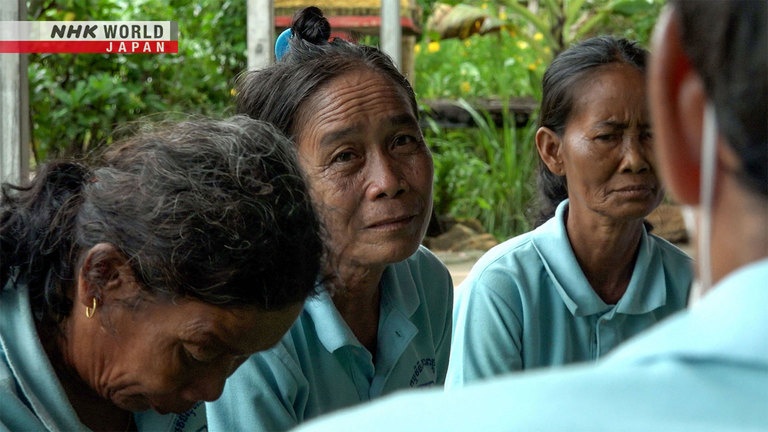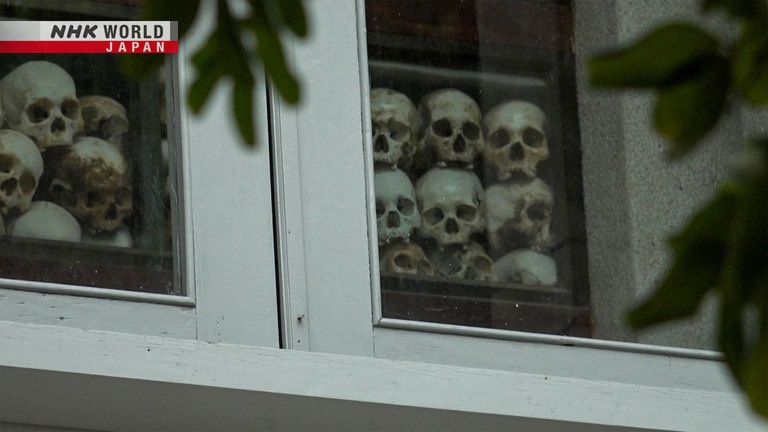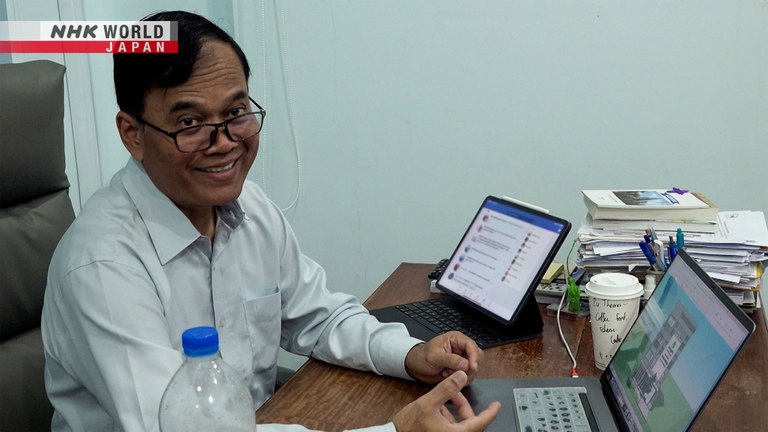An Asian Way To Rebuild "Broken Courage": Chhim Sotheara / Psychiatrist
Cambodian mental health expert Chhim Sotheara tells us about his distinctly Asian methods of healing the many people said to be still suffering the psychological after-effects of the 1970s genocide.



Transcript
Direct Talk
The Kingdom of Cambodia
is situated in the south of the
Indo-Chinese Peninsula.
Of its nearly 17 million people,
it's the younger ones
that drive economic development.
Many people in the country are now said
to suffer with issues of mental health.
Dr. Chhim Sotheara.
He's among Cambodia's leading psychiatrists.
Cambodia does not suffer from PTSD,
but Cambodia suffers from broken courage.
Behind these mental health issues
are the tragic events that
befell the country in the 1970s.
A civil war...
and a genocide.
On today's program,
we'll hear about a Cambodian approach
to healing people
still suffering after an era of madness.
An Asian Way to Rebuild "Broken Courage"
Dr. Chhim is the head of TPO Cambodia.
Established in 1995,
it's one of the country's
leading mental healthcare facilities.
It's provided mental health care
to over 200,000 people.
Psychiatric care was
introduced in Cambodia in the 1990s,
a late start compared to
some Western countries.
Cambodian people do not
understand what mental health is.
And, Cambodian people
do not seek
mental health care because they think that
this is a kind of black magic,
ghost possession or something like that.
This is the tanmin.
She said five people hold her,
and the monk burned different place in the body,
in order to get rid of the spirit.
In term of
the needs of mental health care was shown.
That was due to the fact that
Cambodia had been through
so many years of war,
genocide
and social political unrest
in Cambodia.
Many of these mental health problems
can be traced back to the
Khmer Rouge's rule in the 1970s.
Ostensibly a form of primitive communism,
they murdered teachers, journalists, doctors,
and other intellectuals, one after another,
as "enemies of the revolution."
Throughout the country
are the "killing fields,"
sites of massive summary executions.
We don't know where all the victims were buried.
Every year when it rains, the clothes and bones
of victims rise out of the ground.
Around 100 bodies were buried in this mass grave.
They were women and children.
The women were naked, and so probably
raped before they were killed.
Many of the children were killed by having
their heads smashed against trees.
The Khmer Rouge's idea was,
"when pulling out weeds, remove the roots and all."
If a family was thought to be highly educated,
even their children were killed.
The hearts and minds of people here
were poisoned
with the fear that they or their family
might be the next ones killed.
My sister's husband was shot and killed.
They'd just had a baby.
That kind of sadness never goes away.
I'm on medication now, and have been for 6 years.
The medication is for my stress.
My parents and siblings died in my hands.
There was nothing to eat.
Post-traumatic stress disorder
is commonly associated
with experiencing shocking
or dangerous events.
But these Cambodian patients had
symptoms unlike those of PTSD.
So, during the course of
consultations with patients,
I come across a lot of
Khmer concepts called baksbat,
literally mean broken courage.
The courage is broken.
People suffering from "baksbat" are taciturn,
give in easily, and
tend to bury their thoughts.
Dr. Chhim has found
a new conception of trauma,
one that wasn't explained
by the Western understanding of PTSD.
In the Khmer Rouge's time,
to be able to survive,
people needed to
shut,
needed to dumb,
deaf,
and blind.
Imagine,
if someone was bitten one or twice.
I think they have the strength to fight back,
so they have the courage to fight back.
But if someone were bitten again and again
and again and again and again,
for a long time,
I think their courage is broken.
I think we need to
prescribe the courage
in order to reduce the fear.
How can we do that?
Maybe
increase democratic space.
So giving the opportunity for people to talk.
Treatment begins with the patient
verbalizing their symptoms and concerns.
If anything happens, I get anxious. My heart races.
Do you feel like you'll die from this?
I feel I might die, because I have trouble breathing.
When I get anxious, I recite sutras.
Reciting sutras is fine.
Let's look at this from a medical perspective.
Dr. Chhim doesn't dismiss
the religious or cultural beliefs
often seen as obstructions to treatment.
Need the victim to understand,
because in Cambodia there were victims
and they were perpetrators
who were living in the same village,
but they don't talk to each other
because the victim think this one killed
my family members, killed my parents.
So, they don't talk.
So we facilitated the discussion
in front of the Buddhist monks,
Buddhist temple because
we think people will not lie
in the presence of Buddha.
He says religious views and even customs
can be important in approaching treatment.
At the age of nine,
he was forced out of Phnom Penh,
and sent to work in the provinces.
This is Phnom Penh,
somewhere in Kandal Province.
So around this area.
Not far.
I was lucky not to be sent far away.
Otherwise, it was so difficult.
I think life was terrible when some time
you get sick, fever so easily get sick.
But I wonder why at that time we was not die.
Our body, our leg
had a lot of ulcer wounds
and we walked with barefoot, you know,
the grass hit the wounds, it was so painful.
So, I often remember those days.
My childhood dream was not
to be a medical doctor,
but to be an architect or a civil engineer,
because my mother was working in
similar architecture field.
So, my dream is to follow her
and build skyscrapers.
But the Khmer Rouge changed my dream
because after the Khmer Rouge,
there was only about 40 doctors
survived in whole country.
So, imagine then everyone return
from the Khmer Rouge was sick
mentally, physically, hungry.
So my mother said, you must study medicine.
Dr. Chhim is now surrounded by aspiring
young psychiatrists and counselors.
They're working to forge a new future,
cognizant that in the past,
doctors were targeted for killing.
TPO Cambodia is expanding
its reach into rural areas,
where deep-rooted prejudices
against psychiatry are said to persist.
Around 120 kilometers from Phnom Penh lies
'O Meas Chol Village.'
TPO Cambodia has been providing
group mental training for this community.
In 40 years, my husband had never helped
in the kitchen, but now he helps out.
My husband died and I was lonely.
Now I look forward to waking up
in the morning and taking care of the cows.
Also reflecting on our work in the community.
So, our staff have motorcycle
go through the community.
So, I think it is very important
for our professional do not look at,
you know, do not so proud of
our professionalism so much,
not less, but the cultural belief
of the patient.
There is no magic.
And that help improve our mental state
our psychological
strengths
to continue to help as well as
requesting for help from,
from the victim for example.
This is the real house, it's my house.
My clinic.
- So, you draw?
- Yeah.
His dream of becoming an architect
was once lost to the Khmer Rouge.
But the many people said
"You are the architect of the mind."
- You are an architect of the...
- Of the mind. That's what people said.
The young boy who dreamt of
becoming an architect
is now working to rebuild
people's minds as a psychiatrist.
I'm proud to be a psychiatrist
because helping my patient
allow me to heal myself.
They have some mental health issues,
but life is going on.
Because they need to survive.
So they have trauma,
but trauma can be the part of their life.
They suffer but they don't see trauma
as a blockade of their life.
So working with trauma survivor,
it's an opportunity for me so much to learn
because when I help this people,
it helped me heal myself, too.